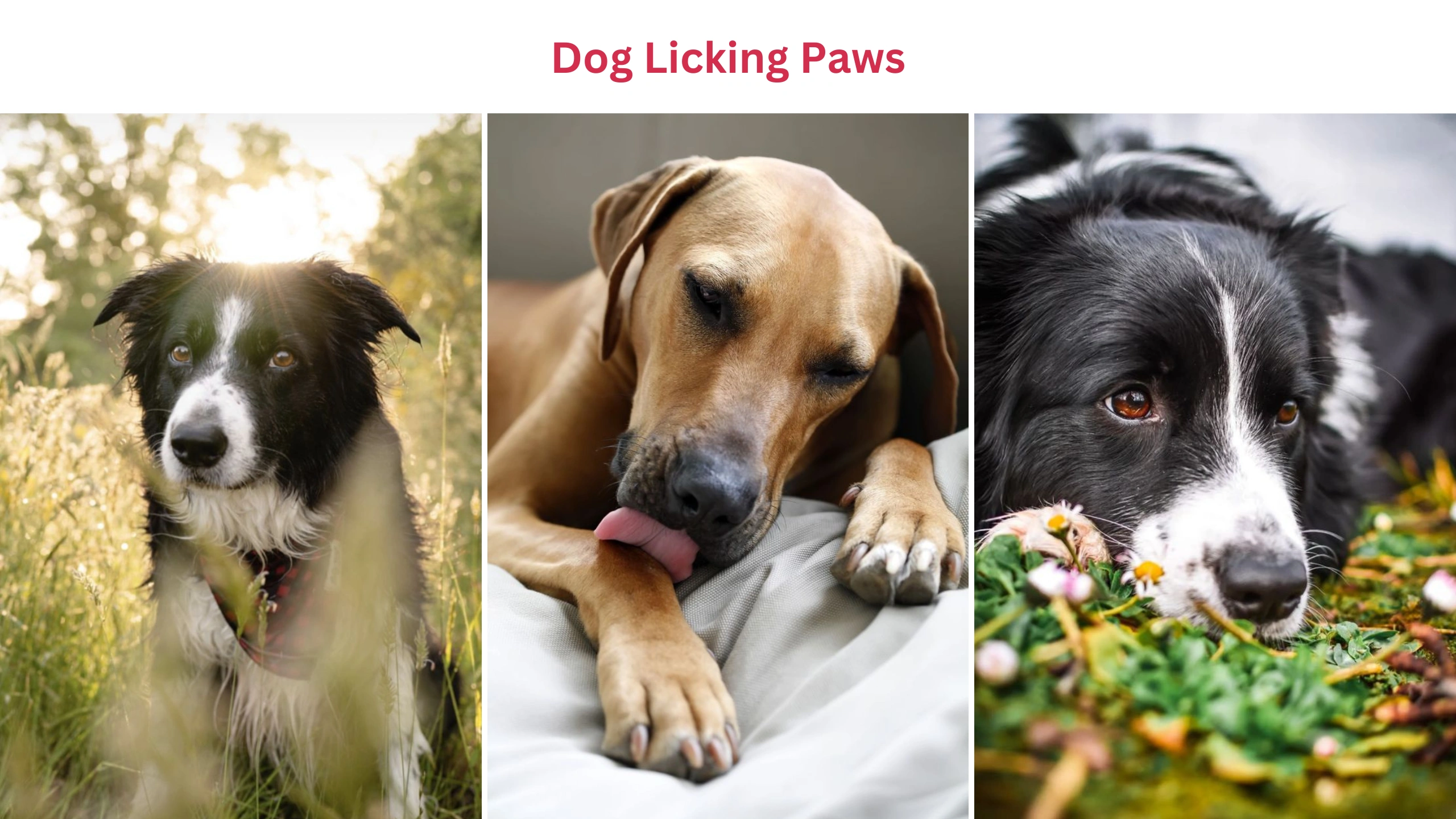Last Updated on February 5, 2024 by Aftab Tariq
Dog licking paws can be a concerning behavior for dog owners, as it may indicate an underlying issue. Inflammation in the paw area is a common problem that dogs face, leading to discomfort and potential bleeding.
The origins of this behavior may be traced back to a wide variety of conditions, ranging from bacterial infections to allergic responses. Owners must pay attention to their dog’s behavior, particularly excessive licking, which might indicate an ongoing issue.
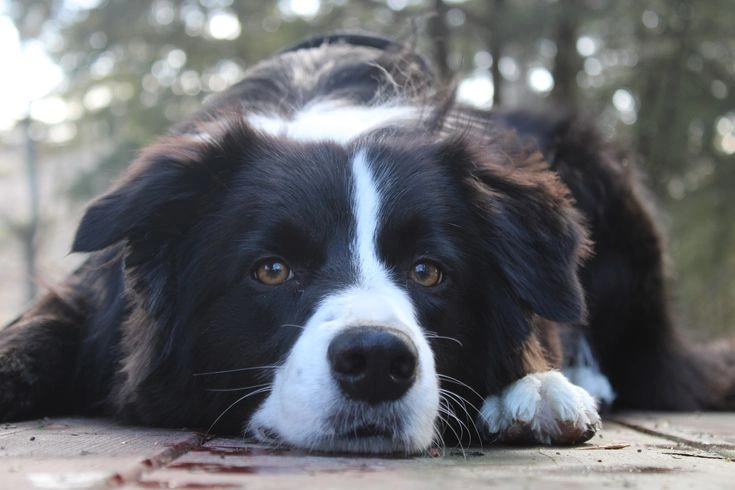
Dogs may develop a habit of licking their paws, and this cycle can lead to further problems such as infections and swelling. The moist environment created by licking can contribute to the development of unpleasant odors and stains on the fur.
To solve paw-licking issues, consult a vet for insights into the root cause. Equipped with tools and knowledge, Vets can pinpoint reasons and recommend interventions. Understanding overall health and environmental factors for proactive, long-term dog well-being.
Causes Of Dog Licking Paws
1. Pain
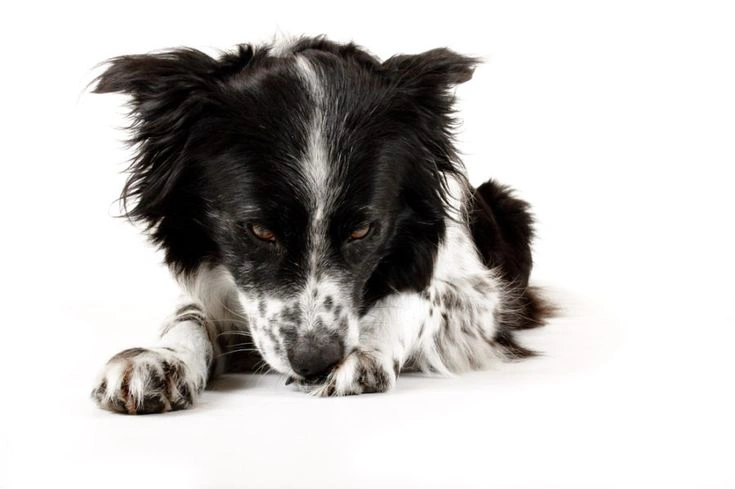
Dogs may engage in paw-licking due to various sources of pain. A fracture, glass pieces, or thorns embedded in their paws can be the culprits causing discomfort. Inflammation, muscle sprains, or irritation from insect bites may elevate their pain level, leading to persistent licking, limping, or even visible signs of distress.
Long or sharp nails can also contribute to pain in the paw area. Pet owners must be vigilant in identifying the source of pain, whether it is wounds, fractures, or other troubles, and promptly seek a vet’s expertise for proper intervention. While a trip to the vet may be necessary for some of these issues, others may respond well to basic first aid treatment.
.2. Allergy
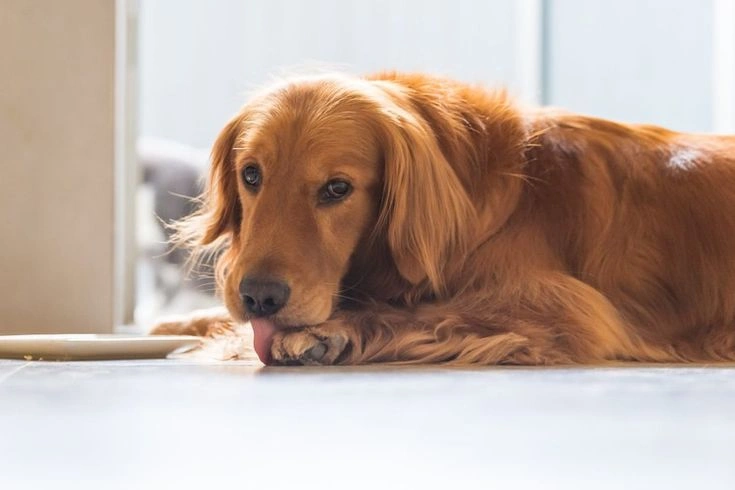
Another common trigger for paw-licking in dogs is allergies. Dogs may react to various substances, such as certain foods, grass, or weeds, causing itchiness, irritation, and persistent licking. Household chemicals or carpet-cleaning products can also be problematic.
Identifying the root cause of allergies, whether environmental or related to specific products, is essential. A vet can conduct a blood test to pinpoint allergens and recommend appropriate interventions, such as antihistamines or changes in diet.
Regular wipe-downs after walks and yard activities can help mitigate exposure to potential allergens, ensuring a healthier, itch-free experience for the pet.
3. Gastrointestinal Issues in Dogs
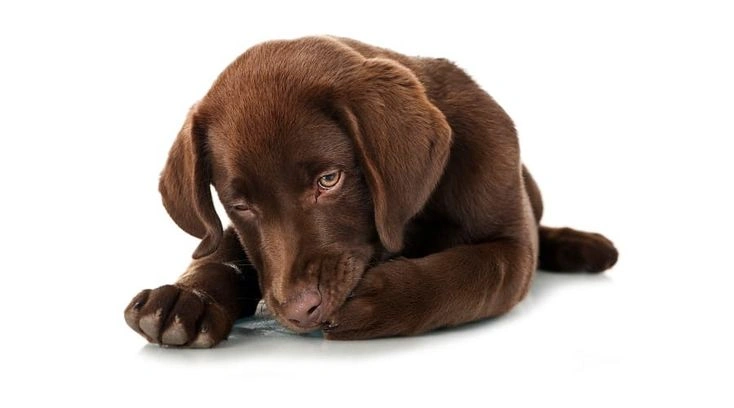
Regarding gastrointestinal issues in dogs, various factors can contribute to abnormalities in their digestive system. Like humans, dogs may experience stomach, duodenum, or pancreas issues, leading to problems such as pancreatitis.
Recognizing signs of GI problems is crucial for pet owners. Licking of paws, frequent stomach-related symptoms, and unusual behaviors may indicate infiltration of GI issues.
Veterinary examinations, including ultrasounds and biopsies, are crucial in identifying the sort and number of issues a dog may face. Understanding and treating dogs’ complicated gastrointestinal problems requires extensive medical history study and testing.
4. Boredom in Dogs
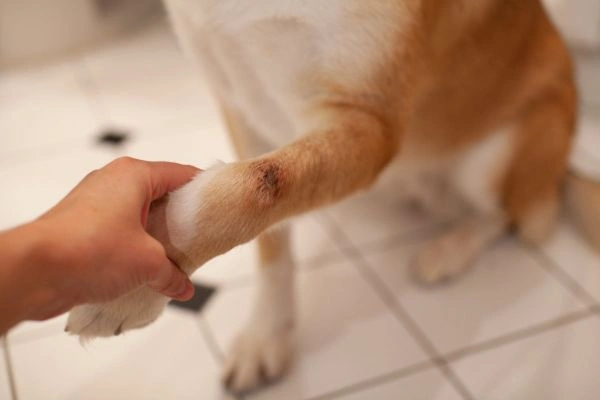
Boredom in dogs can manifest in various behaviors, emphasizing the importance of engaging in activities. Dogs in modernized homes may experience a lack of mental and physical stimulation, leading to destructive behaviors such as excessive chewing or licking of paws.
The risk of boredom-related issues increases when dogs lack proper outlets for their energy, such as walking, hunting, or engaging in scavenging behaviors in the yard.
Providing a stimulating environment, interactive activities, and opportunities for dogs to express their natural behaviors is essential for mitigating boredom and ensuring our furry friends’ well-being in a domesticated society.
Ways to Avoid Dog Boredom
- Leave your dog at home unattended for a short time.
- Give your dog a Kong stuffed with treats if you have to leave them alone for a while.
- Make sure your dog has plenty of time to run around and play.
- Spend 30 minutes daily walking or playing fetch with your dog in the park.
- Give your dog plenty of opportunities to interact with humans and other canines.
- Don’t confine your dog in a kennel or leave it chained outside all day.
5. Dog Licking Paws Anxiety
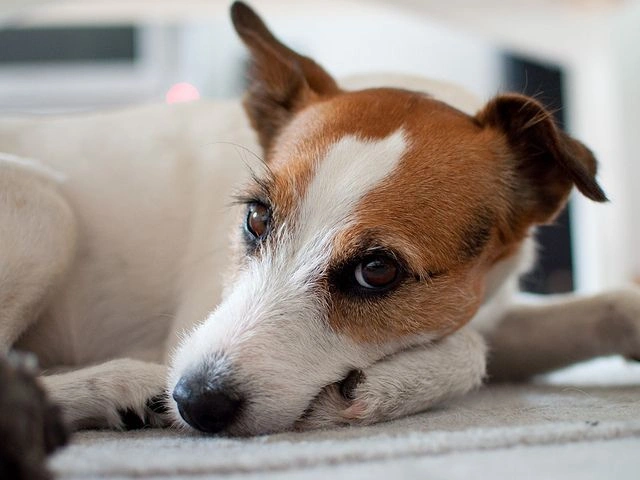
Extreme self-licking is a common coping mechanism for anxious canines. Anxiety may have many different root causes, from trouble with separation to OCD. In this regard, paw-licking or chewing in dogs may be akin to human nail-biting.
Before going to sleep, it has been reported that several canines have been spotted licking either themselves or their paws. Simply put, it is how they de-stress and return to a more relaxed state on their own time.
- Potential Canine Anxiety Triggers
- Boredom
- Insufficient physical activity
- Depression
- Illness
Extreme or obsessive licking in dogs may lead to the development of ”lick granuloma,” an ugly ulcer. Lick granulomas have been linked to both anxiety and depression. However, it is unclear which comes first. It is a classic “chicken or egg” problem.
6. Displacement Behavior
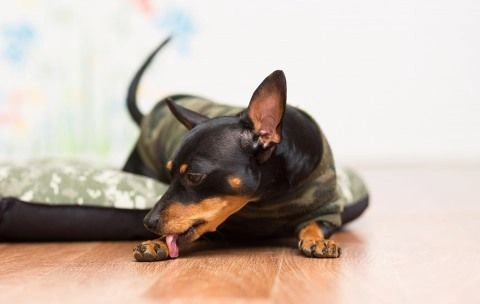
Dogs sometimes show displacement behaviors, like paw-licking or chewing, when in confusing or stressful situations. For example, dogs might chew toys on the floor in boarding or new places because they can’t express themselves well.
These behaviors, including paw-licking or staining, can happen when dogs feel anxious. To help, try impulse control exercises and proper training with toys to give them a positive outlet for their feelings. It makes for a happier and more comfortable environment for our furry friends.
7. Hormonal Imbalance
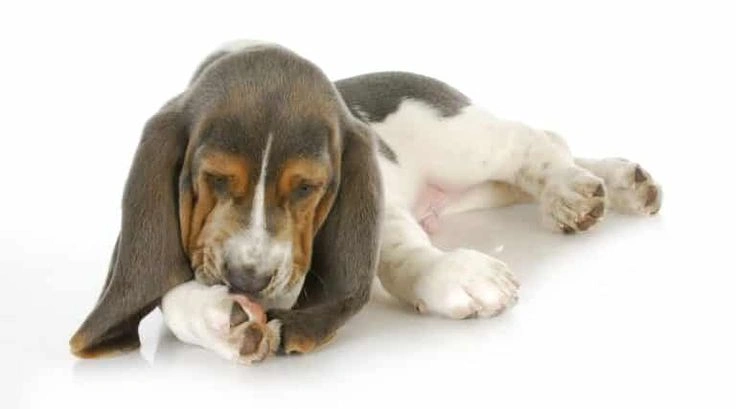
Both Cushing’s disease and hypothyroidism in dogs can contribute to hormonal imbalances, impacting various aspects of their health. The body’s production of cortisol, a hormone linked to stress, is elevated in Cushing’s disease, leading to conditions such as baldness, skin issues, and patches on a dog’s coat.
Conversely, hypothyroidism, characterized by insufficient thyroid hormone, can result in hair loss, skin problems, and spots on the body. Identifying these hormonal imbalances is crucial, as they can affect the quantity and quality of a dog’s coat.
Medication and veterinarian treatment are necessary to manage these illnesses and prevent skin infections. The hormonal equilibrium of our pets may be restored by paying attention to the signs and responding swiftly.
8. Flaky Face
Over bathing or living in a cold, dry climate are two common causes of dry skin in dogs, but breed may also play a role.
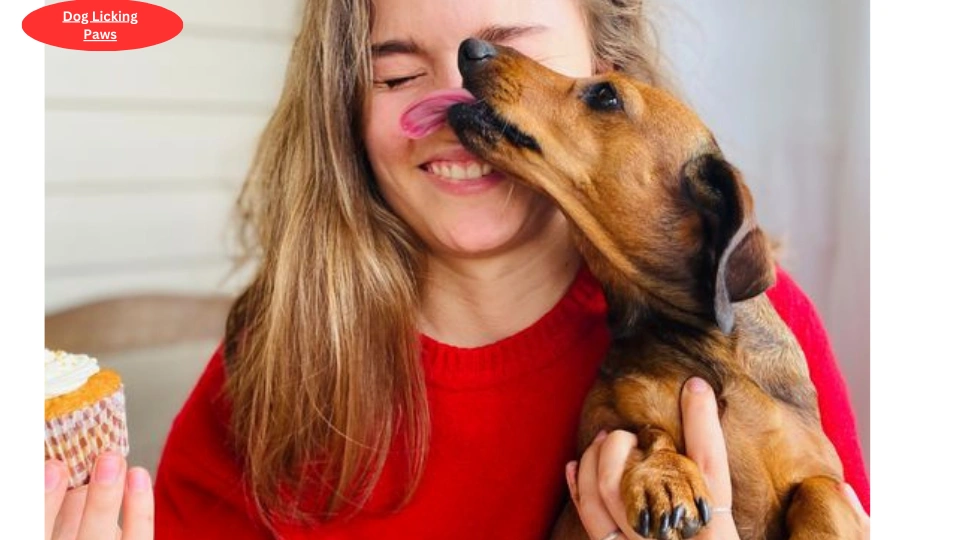
- Specific to breeds
Because they lack the hair’s natural defense, many hairless breeds are predisposed to developing skin problems. The American Hairless Terrier, the Xoloitzcuintli, and the Chinese Crested all fall within this group.
- Arid conditions
Dogs in cold, dry locations can get skin problems from dry air. If so, see your vet about a natural dog lotion or oil that might help with the dry skin. If your dog suffers from dry skin, excellent vitamin and oil supplements may help without leaving a greasy mess around the home.
- Methods of hygiene
You should avoid giving your dog frequent baths or using soaps that are too harsh if it has dry skin for no apparent reason.
9. Combating Fleas and Ticks
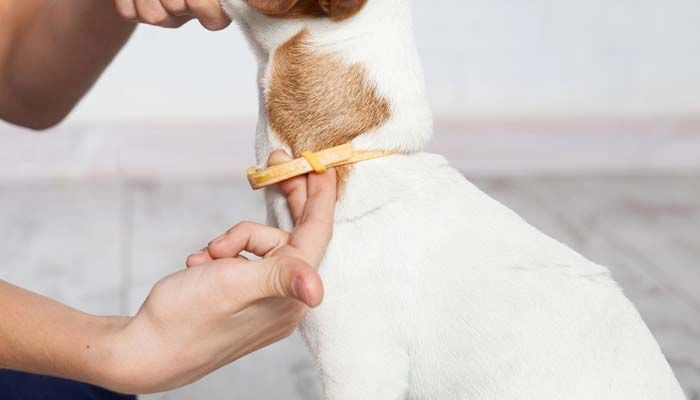
Fleas and ticks pose a persistent challenge for pet owners, requiring effective techniques for prevention and treatment. In addition to making dogs‘ skin itch and more susceptible to allergic reactions, fleas can infest houses and coats.
Chemicals and flea treatments, including the dog licking paws treatment, are often used. However, it is important to take measures to prevent unpleasant consequences, such as allergic reactions. Techniques like regular grooming, household cleaners, and pet-safe pesticides can help maintain a flea-free environment.
Ticks, another concern, can transmit illnesses and require specific attention. Employing tick prevention methods, such as avoiding tick-prone areas and using tick medicine, is crucial for keeping pets healthy and free from these disease-carrying parasites.
10. Dealing With Deicing Salts
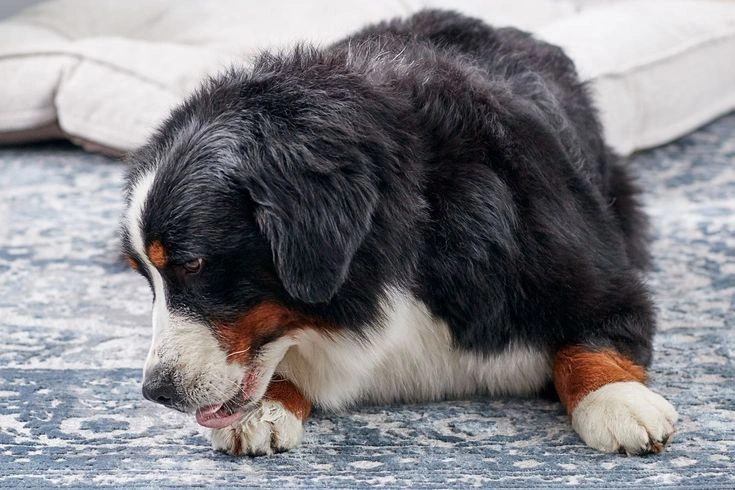
During winter weather, deicing salts become a concern, particularly for dogs. These salts, commonly used on roads, driveways, and walkways, can cause burns on a dog’s paws and irritation on their feet. After walking in a salted area, it is best to put dog boots on your dog or clean their paws with a towel.
It will help preserve your dog’s paws. In addition, providing an alternative entrance with a bowl of water for rinsing feet can prevent contact with deicing agents. Responsible use of salts, awareness of potential burns and the importance of dog-friendly footwear ensures a safer experience for pets during the winter season.
11. Balls of Ice
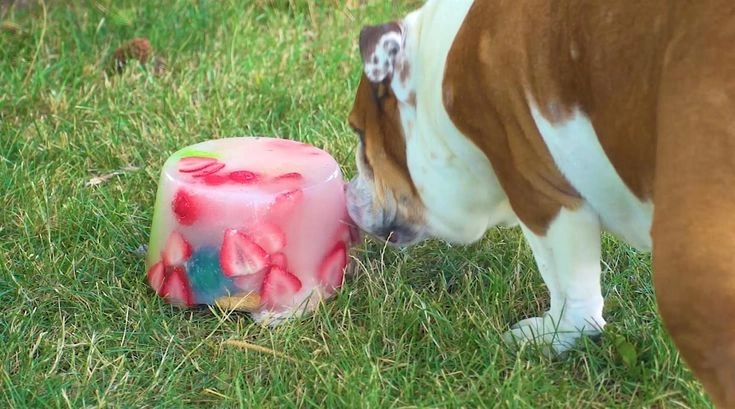
Ice balls might develop between his hairy toes when snow becomes trapped in your dog’s fur. It may lead to cracking, bleeding, and hair pulling, all of which are highly uncomfortable.
In the colder months, you should keep the hair short between your toes and pads. Rub Crisco between the pads and into the fur of a particularly hairy dog to prevent ice balls from forming.
12. Affecting the Yeast
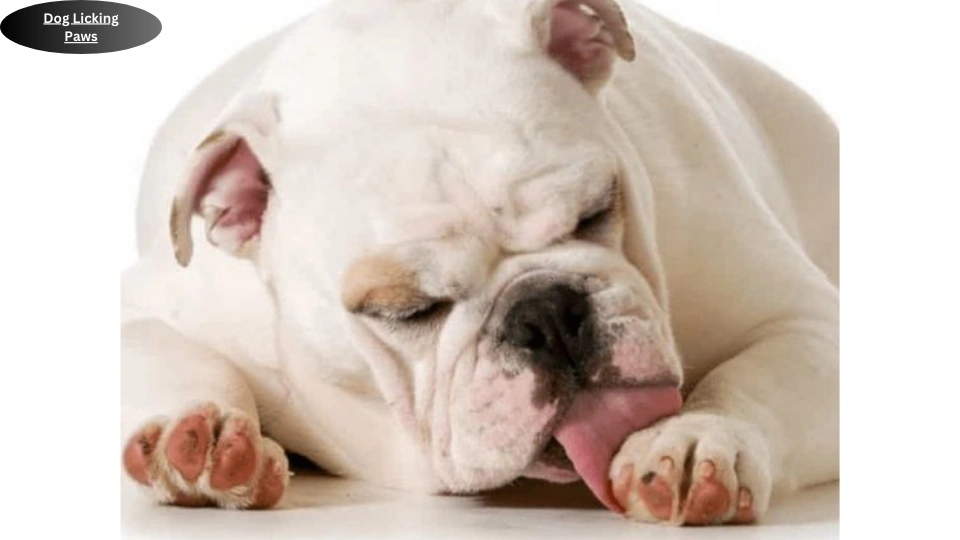
A bad diet may be to blame if you have a yeast infection. Changing your dog’s diet as directed by your veterinarian may be the easiest solution to hair loss and itching caused by a yeast infection.
Be careful to provide them nutritious meals high in the vitamins and minerals their digestive system and skin need.
How to Put an End to Your Dog’s Paw-Licking?
Something as simple as a mosquito bite might have set off your dog’s discomfort, but their chewing and licking could have worsened the situation and even led to an infection.
Stopping your dog from licking its paws and relieving any associated discomfort, irritation, or itching are necessary to solve the problem permanently. Naturally, treatment has to focus on eliminating the root of the issue.
- Put a cone or Elizabethan collar on your dog.
- Please give them a lot of chew toys to keep them occupied.
- Give them plush Kong’s to play with so they don’t get bored.
Treatments For Scratchy Puppies at Home
Use a steam vaporizer or humidifier if your dog has allergies or dry skin. The steam moistens the dry air and decreases the likelihood of mucus buildup in your dog’s nasal passages. Keeping the humidifier clean is important to avoid mold growth, which might worsen the discomfort.
If your dog has an allergy, wiping its paws whenever it comes inside from outdoors is a good idea. Put a wet washcloth to use.
Apply a 10-minute foot soak of chilly water and oatmeal shampoo on your dog’s paws. Allergens may be washed away, and the cold water can help relieve skin itching.
Do your dog a favor and boost his diet with some fish oil. It may take 8 -12 weeks for fish oil’s anti-inflammatory and immune-boosting effects in a dog.
Veterinary Approaches to Dog Paw-Licking
· Managing Anxiety
For dogs exhibiting anxiety, it’s crucial to identify the root cause. Prevention is preferable to medication whenever possible.
If the source of stress can’t be removed, sedatives may be prescribed. Additionally, pheromone plugins or Bach flower remedies might prove beneficial in calming anxious dogs.
· Addressing Food Allergies
When dealing with food allergies, veterinarians often recommend a specialized diet. This diet may include a single novel animal protein or proteins that have been chemically altered to minimize allergic reactions.
· Handling Non-Food Allergies
Non-food allergies may necessitate antihistamines or, in severe cases, steroid shots. However, due to potential side effects, steroids are typically considered a last resort and not for long-term use.
The primary approach to managing allergies remains to avoid the irritant causing the reaction. Veterinary treatments offer tailored solutions to various causes of paw-licking, ensuring a comprehensive and effective approach to canine well-being.
“In the wise words of Dr. DeMarco, ‘The dog should definitely be paired with veterinarian expertise and then treatment of the underlying cause,’ emphasizing the importance of collaboration for canine well-being.”
If your dog is licking its paws a lot, it could indicate issues like allergies, irritation, pain, or anxiety, revealing the ‘dog licking paws meaning.’ Watch for redness or swelling. Allergies to food or the environment may be causes, and pain, such as arthritis, could be a factor.
How to Stop Dog from Licking Paws Home Remedy?
-
Check for Irritants: Examine the paws for signs of irritation, cuts, or foreign objects. Remove any potential irritants.
-
Keep Paws Clean and Dry: Regularly clean your dog’s paws to remove allergens and debris. Ensure they are thoroughly dry after walks or exposure to water.
-
Use Epsom Salt Soaks: Soaking your dog’s paws in a diluted Epsom salt solution can help reduce inflammation and soothe any discomfort.
-
Apply Apple Cider Vinegar to Stop Dog Licking Paws: A mixture of apple cider vinegar and water can be sprayed or dabbed onto your dog’s paws to discourage licking.
-
Consider a Dog-Friendly Balm: Apply a dog-friendly paw balm to moisturize the paws and provide a barrier against irritants.
-
Adjust Diet: Allergies or sensitivities in a dog’s diet can contribute to paw licking. Consult with your vet to explore potential dietary changes.
-
Use a Cone or Elizabethan Collar: Preventing access to the paws with a protective collar can break the habit of excessive licking.
-
Consult with a Veterinarian: If the licking persists, consult your veterinarian to rule out any underlying health issues or allergies. They can provide tailored advice and may recommend medications or other interventions.
If your dog keeps licking one paw persistently or is consistently dog licking paws a lot, it’s advisable to consult with a vet to identify and address the underlying issue.
Frequently Asked Questions
Why Does My Dog Lick Their Paws Excessively?
When Should I Be Concerned About My Dog Licking their Paws?
How Can I Prevent My Dog From Licking their Paws Excessively?
Why Does my Dog Keeps Licking Paw But Nothing there?
Sources
Best Friends Animal Society. (2019)
American Kennel Club (AKC). (2017).
I am a dedicated content writer with more than five years of experience, particularly skilled in the art of storytelling. My writing journey commenced during my college years, where I pursued journalism and unearthed my talent for creating captivating narratives.

